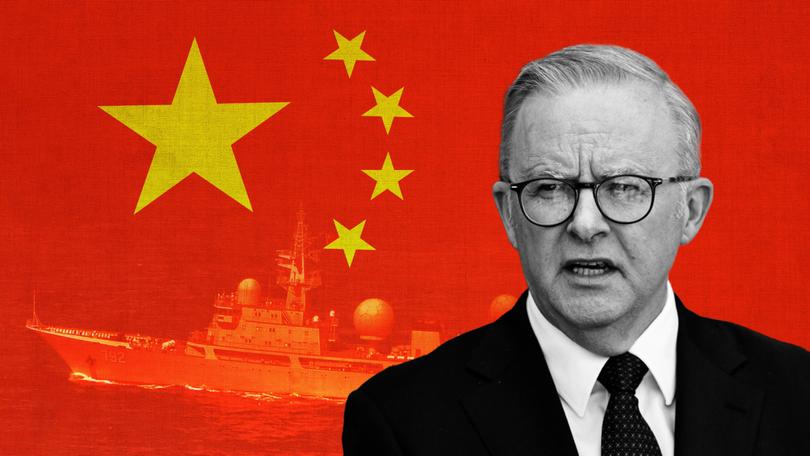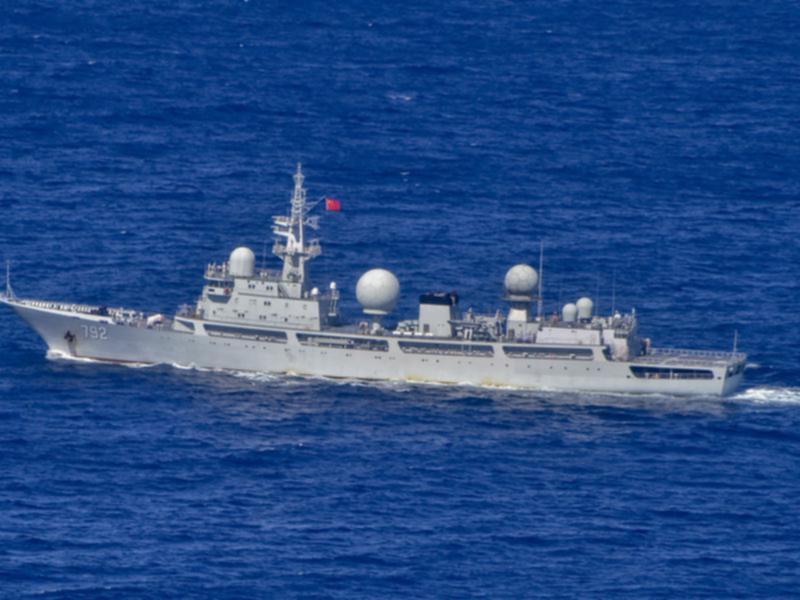Anthony Albanese’s China warships response will be read as ‘weak’ by Beijing, former US attaché warns
LATIKA M BOURKE: Anthony Albanese’s restrained response to China’s live-fire exercises off the Australian coast will be seen by Beijing as ‘weak’, prompting aggressive displays of force in Australia’s backyard.

Former US Defence Attaché to Australia Ray Powell says Prime Minister Anthony Albanese’s restrained response to China’s live-fire exercises off the Australian coastline will be seen by Beijing as weakness and prompt more aggressive shows of force in Australia’s backyard.
China conducted drills in the Tasman Sea around 300km off Sydney’s coastline over the weekend, at the same time commercial planes were flying overhead, Defence Minister Richard Marles said, a development he described as “disconcerting.”
Australia and New Zealand deployed navy ships to monitor the Chinese vessels. Chinese state media warned Australia to get used to seeing more warships in the area. New Zealand’s Defence Minister Judith Collins told RNZ the three Chinese vessels were currently 520 kilometres east of Tasmania.
Sign up to The Nightly's newsletters.
Get the first look at the digital newspaper, curated daily stories and breaking headlines delivered to your inbox.
By continuing you agree to our Terms and Privacy Policy.The Chinese are refusing to answer New Zealand’s questions about what they are doing in the area.
Mr Marles said China gave insufficient notice about the drills, about which Foreign Minister Penny Wong complained to her Chinese counterpart at a G20 meeting in South Africa.
But asked if he would raise the issue at a leader-to-leader level with President Xi Jinping, Prime Minister Anthony Albanese bristled, having defended China’s right to conduct its drills in the Tasman Sea saying they were conducted in international waters.
“China did comply with international law, and that’s important to not suggest that that wasn’t the case,” Mr Albanese said.

Asked if there might be any retaliation, Mr Albanese noted Australia’s trade dependencies on China and said Australia and her allies did the same in the South China Sea.
“You do know that most of the trade goes from here to there, not the other way around?” Mr Albanese said to reporters.
“And I’ve worked pretty hard to make sure that products, including seafood products, can get into China to where something like $20 billion, one in four Australian jobs are dependent upon trade, and China is our major trading partner.
“We’ve made appropriate representations.
“Australia also undertakes by sea and air activities in international waters and international air space.”
Ray Powell served as US Defence Attaché in Canberra between 2017 and 2020 and since retiring from the US Air Force closely monitors the Chinese Navy’s conduct at his website Sealight.live.
Asked if Mr Albanese’s response was weak, Mr Powell told The Nightly: “I do think it has been extremely restrained.”
He said China would view “acquiescence as weakness” and would be emboldened.

“By sort of excusing what China has done because it is not technically illegal under international law and because other countries have exercises far away —- what China hears is none of that, it essentially hears weakness,” he said during a telephone interview from California.
“If you show them weakness then they will generally move into that space with more aggression.
“Because what they’re trying to do, is they’re trying to figure out what is the level of aggression that we can kind of get away with without provoking a strong reaction.”
He also said it was wrong to draw an equivalence between international drills in the South China and East China Seas as those international waterways were used for commercial shipping by multiple nations.
He said by contrast, the PRC’s decision to travel to international waters between Australia and New Zealand was a direct test.
“You have to go there because there’s no other reason to be there in the Tasman Sea,” he said.
“It’s not illegal, that’s correct but it is very aggressive.
“Going into the Tasman Sea is a message and I think it needs to be understood as that.
“If you’re going to be in our backyard then we’re going to be in your backyard.
“We have this capability that can threaten both Australia and New Zealand.”
He said it was critical to respond early because otherwise, the Chinese would continue pushing the boundaries.
“By failing to react strongly Australia, invites more acts of aggression from China,” he said.
“The idea is eventually by normalising it then you don’t really have the reason to react the second or third or fourth time because well you didn’t react the first time.”
Chinese state propaganda outlet Global Times carried warnings that Australia should get used to the regular maritime presence.
“With the PLA Navy continuing to make strides toward the deep blue water, drills like these will become more frequent, and some countries should adjust to this trend,” the outlet reported, citing Chinese military expert Song Zhongping.
The Australian government said on Thursday 13 February that a Chinese naval task group — including a frigate, cruiser and a tanker - was operating in the Coral Sea and that one of the vessels had crossed the Torres Strait.
But it was a Washington-based reporter for the Financial Times who revealed the task group had travelled south and was around 300 kilometres off the Sydney coastline.
Defence Minister Richard Marles said China notified its live fire as commercial planes were flying overhead but not with the same amount of warning time that Australia would give.
“They notified a live firing exercise, but with very short notice, which meant that that was very disconcerting for planes that were in the air; Qantas, Virgin, Air New Zealand,” Mr Marles told Sunrise on the weekend.
“This is obviously a very disconcerting set of circumstances.
“We do live firing on the high seas in terms of the Royal Australian Navy, but we would tend to give 12-24 hours notice so that airlines are able to plan around that, and that’s not what happened here.”
China’s Defence spokesman Wu Qian accused Australia of slander.
“Despite being fully aware of the fact, Australia has unjustly criticised China and deliberately exaggerated the issue, and we are astonished and strongly dissatisfied with this,” he said.
Guo Jiakun, a spokesman for China’s Ministry of Foreign Affairs said the Chinese fleet was carrying out an exercise in a safe manner.
“A Chinese fleet organised by the PLA Southern Theatre Command is conducting far seas exercise,” he said.
“The drill was carried out in a safe, standard and professional manner and in accordance with relevant International law and international practice.”
